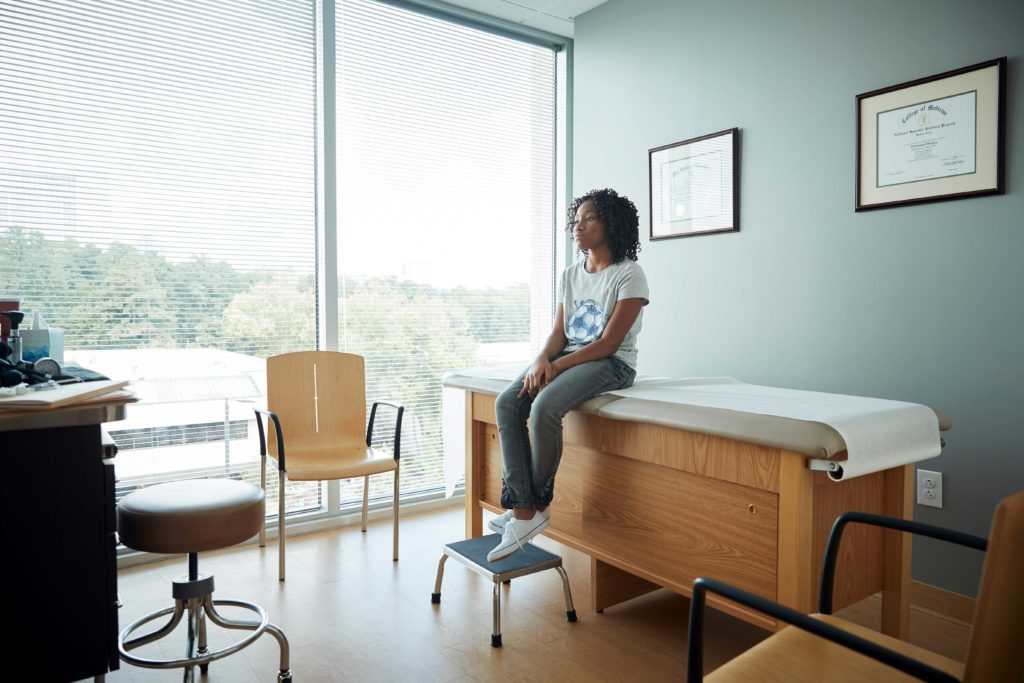
This is a contributed post from Talia Varsano, teen writer.
I’m sitting in a familiar spot – the waiting area outside Gynecological Radiology at the Mayo Clinic, waiting for my older sister’s latest MRI to conclude.
She’s finally on the verge of surgery, the only way to definitively diagnose endometriosis. I wanted to support her on this visit, the latest twist in a six-year-long journey that has been nothing short of agonizing – physically and emotionally.
Teen girls often struggle with speaking up regarding their healthcare needs.
Teenage girls like me have not always been in the best position of empowerment or prepared to advocate with the medical establishment from which they seek care.
I have grown up watching my sister deal with often debilitating pain and discomfort. I’ve held her hand more times than I can count, as she’s had blood drawn and invasive probes inserted by specialists and hospital ERs all over the country.
The path toward an affirming diagnosis, versus more expedient and often default answers given to teen girls, has been discouraging, characterized by theories related to period pain, gastrointestinal (GI) symptoms, and even “sensitivity.”
I wonder who has the financial and emotional means to go to these lengths to get a diagnosis. Should it take only the most elite institutions to solve the problem?
Healthcare professionals often label misdiagnosed illnesses as psychological issues.
As my parents and sister compiled case notes for a visit to the Mayo Clinic, they revisited comments from a GI specialist we respected. In response to my sister’s skepticism about his blanket diagnosis of IBS, we felt gas-lit: “… patient’s complaints are attributable only partially to IBS – 10% vs. 90% psychological-heavy emphasis on the latter.”
Countless appointments with pediatricians, GI specialists, renowned children’s hospitals, and nutritionists yielded similar reactions following standard tests and hypotheses.
This is not a unique dynamic that my sister has faced. Instead, this unfortunate pattern characterizes the healthcare experience that many teen girls experience today, even when being treated by female practitioners.
A 2019 survey from TODAY found that among women 18-34 with a chronic health condition, 49% said they felt they needed to prove their symptoms, and 38% said a healthcare provider ignored or dismissed their symptoms.
This longstanding trend has surrounded women’s health care, and it’s scary and outdated.
My sister’s pain was repeatedly dismissed, and instead, she was told that she was “sensitive” and “this is typical menstrual pain or part of becoming a woman.”
Healthcare practitioners must change their approach to women’s medical needs, especially teen girls.
The medical community is not trying to be insensitive regarding endometriosis. Rather, the lack of awareness and research on numerous issues specific to women’s health contributes directly to default habits, now prominent in pediatric healthcare.
Denise Davis, MD, clinical professor, and faculty physician, is noted to have said, “Biases are not moral failings; they are habits of mind.”
With a focus on persistent change, habits can be altered. There is an opportunity to do better, making advocating for ourselves all the more critical. Arming ourselves with basic knowledge is the first best step.
Related: Five Simple Ways to Teach Your Teen How to Self-Advocate
Endometriosis is a commonly misdiagnosed illness in young women.
According to the American Journal of Roentgenology, 10-15% of menstruating women have endometriosis. Endometriosis symptoms differ from person to person.
My sister experienced constant bloating, extreme fatigue, intense cramps, and lower back pain which would shoot through her hips and down her legs. She also often experienced constipation or diarrhea, a common symptom of IBS.
According to Weill Cornell Medicine, endometrial tissue can spread to other parts of the body, affecting multiple organs. In my sister’s case, her appendix was severely affected and ultimately removed, and other organs were inflamed.
According to Tatnai L. Burnett, MD, a gynecologic surgeon at the Mayo Clinic, “If I had endometriosis for years – and I treat endometriosis – my bladder, which is close to the endometriosis, may still have prolonged dysfunction because the nerves in that area are also getting abnormal signals from the brain because it’s been over-exposed to pain for too long.”
Further, in thinking about the possibility of endometriosis, Dr. Burnett talked about the unique dynamics of pain in pediatric patients specifically. Given how pain can have lasting pathways, something of a memory, it is critical to treat, not endure pain. “When you see pain repeated over and over again, that pain tends to set up shop in our brain essentially and becomes the pathways [which] keeps firing, even sometimes when the original cause of the pain isn’t there.”
For teenage girls whose brains are still developing, catching and dealing with this situation quickly is paramount. “The younger someone is, once pain becomes chronic, the harder it is to treat even if we find the initial cause of that pain,” Burnett said. “Simply because the brain tends to hang onto the memory of that pain, and it just becomes more and more difficult to treat.”
Related: 6 Tips to Prepare Teens to Take Charge of Their Health and Wellness
Five tips to help teens become effective healthcare advocates.
My intention in telling my sister’s story is not to criticize our medical system; but rather to bring to light the experiences she and many girls face. Young women should be prepared to face the medical establishment – whether endometriosis or any other condition.
Parents and families might also be subconsciously programmed toward dismissing that with which they have little familiarity. Teen girls need and deserve a support system when pursuing healthcare answers.
So, how best to prepare yourself for a healthcare advocacy journey?
My sister and I have talked at length about what we might have done differently if the clock were turned back six years:
1. If you don’t feel right or have pain, don’t let anyone talk you out of it.
Every girl’s pain is legitimate and must be addressed based on the individual patient and what she presents – NOT based on what others, healthcare professionals included, think the pain experience should be. If you’re not being heard, respectfully request further evaluation and opinion.
2. Take detailed notes over time and bring them to appointments
It is critical to take an analytical (versus an emotional) approach to your medical experience over time. Journal by day and time and include even the most mundane dynamics, inclusive of all food and drink (ingredients), time of consumption (and any physical reactions), stage of monthly cycle, correlation of various stages of pain to menstrual cycle, the effect of birth control (pill, IUD) on pain, etc.
3. Be respectful of your doctors, but don’t put them on a pedestal.
Doctors have a body of knowledge that grounds their perspective. Be sure to avail yourself of all they have to offer, but realize they are still people with built-in biases, preconceived notions, and, unfortunately, sometimes lacking specialized knowledge.
Seek referrals to well-respected specialists. If you try a solution that is ineffective, consider that something else might be happening.
4. Do your research and document your questions.
There is so much misinformation out there. Leverage the most reputable resources online, document your questions and beliefs in relation to your symptoms, and bring this documentation in a type-written, organized format to your appointments.
5. Be resilient.
In my sister’s case, abdominal pain can mean many things, and in girls, the matrix of possibilities is infinitely more complicated. Recognizing degrees of pain and abnormality is deeply subjective.
If you hear dismissive conclusions, don’t be wounded.
Dr. Burnett’s advice: “…empower young women to seek help from providers who are adequately skilled and able to be compassionate and deliver a cure to get them healthy.”
Push on until you‘re confident your doctor is hearing you and pursuing the full range of possibilities.
Don’t ever give up!
Are you in the thick of raising your tweens and teens? You may like this book by Whitney Fleming, the co-owner of Parenting Teens & Tweens: Loving Hard When They’re Hard to Love: Essays about Raising Teens in Today’s Complex, Chaotic World.

* This post contains affiliate links where we earn a small commission for sales made from our website.






Leave a Comment